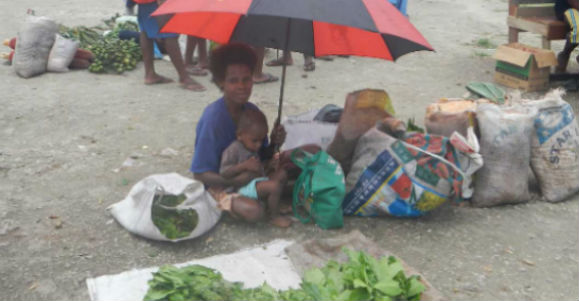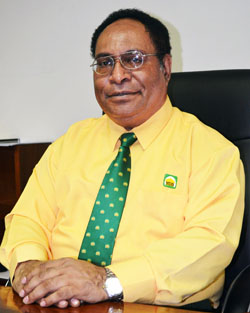The launch of the Papua New Guinea Government’s master plan to develop the Small and Medium-sized Enterprise (SME) sector reflects a growing acknowledgment that PNG needs to proactively grow sectors beyond mining and petroleum.

More SMEs will see a migration from the informal to formal sector. Credit: ssvmusa.org
Launching the government’s ambitious SME plan in Port Moresby late last month, Prime Minister Peter O’Neill said the government would be committing K200 million every year to support the plan, starting this year, and that certain areas of business activity will be reserved only for Papua New Guineans.
The plan supports the O’Neill’s Government’s long-stated development goal of creating 500,000 new SMEs by 2030, and the announcement of the revival of the small-business focused Stret Pasin Stoa Scheme in April 2015.

The National Development Bank’s Moses Liu
Development Bank to lead
‘The National Development Bank (NDB) will be the main implementing agency to raise the number of SMEs through the provision of affordable credit facilities to the SME sector,’ the bank’s Managing Director, Moses Liu, told Business Advantage PNG.
He says the bank will also be offering financial and literacy skills training through its ‘Businesses Incubation Scheme’.
‘The Government has budgeted K65.1 million in the 2016 budget for the normal development credit funding to the SMEs in 2016,’ says Liu.
‘However, the Government will provide specific funding to implement the new SME Policy which will target all sectors, including the agriculture, tourism and fisheries projects.’
‘The country needs to broaden the base of its economy,’ Trade, Commerce and Industry Minister, Richard Maru, said at the policy launch. ‘We cannot always depend on the resource sector.’
His comments echo those of Agriculture Minister Tommy Tomscoll, who last week said PNG has to move away from depending too much on its oil and gas resources.
Moses Liu agrees.
‘The SME sector will provide the stability for future economic growth as it will be based on mobilising investment in the renewable resources (sector) rather than the non-renewable resources,’ he says.
Wider benefits
‘The engagement of a bigger number of PNG people in running their business will create more jobs for locals and raise the revenue base and tax base, (resulting in) more income tax,’ says Liu.
‘The country needs to broaden the base of its economy, so we are able to withstand the external shocks we are exposed to with resource and commodity prices … we now need to grow a class of entrepreneurs and businesses …’
It will also mean more Papua New Guineans will move from the informal sector to the main economic sector, says Liu, adding that if the policy is successful, ‘SMEs’ contribution to GDP will rise from the current six per cent to 50 per cent by the year 2030’.
Business support

POMCCI’s David Conn
David Conn, CEO of the Port Moresby Chamber of Commerce and Industry (POMCCI) agrees that the policy reflects a growing recognition that the country cannot continue to rely solely on the resources sector.
‘The country needs to broaden the base of its economy, so we are able to withstand the external shocks we are exposed to with resource and commodity prices,’ he told Business Advantage PNG.
‘In broad terms we support it,’ he says. ‘The country needs to actively involve its citizens in the national economy and we need to have a wider, broad-based economy to give us more resilience.’
PNG’s largest bank, Bank South Pacific (BSP) and Mainland Holdings, one of the largest agri-businesses in PNG, have each given K50,000 to get the plan off the ground.
‘The engagement of a bigger number of PNG people in running their business will create more jobs for locals and raise the revenue base and tax base.’
BSP’s Area Manager of the Southern Region, Nuni Kulu, says the bank has over 15,000 SME customers and last year provided K37 million in SME loans. According to the bank’s company presentation in 2015, 0.3 per cent of BSP’s loans went to SMEs.
However, a report in The National shows that 94.4 per cent of PNG’s SMEs have never obtained any form of loan and 97.5 per cent of the SMEs have not received any form of direct government assistance. Only 2.5 per cent of the country’s SMEs received assistance from the Government in the form of cash or kind.
Entrepreneurs required
‘We now need to grow a class of entrepreneurs and businesses, who need to understand businesses are built by hard work and industry,’ says Conn.
‘PNG has all the essential ingredients, especially on the land, where we need to move to secondary processing of our product—much of it organic and world class standard.’








Speak Your Mind